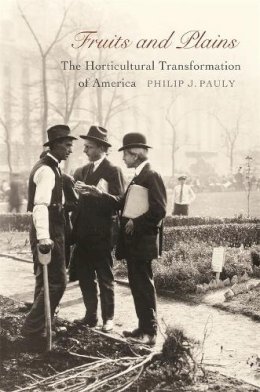9%OFF
Stock image for illustration purposes only - book cover, edition or condition may vary.
Fruits and Plains
Philip J. Pauly
FREE Delivery in Ireland
Description for Fruits and Plains
Provides an understanding of how horticulture shaped the vegetation around us, and how it influenced our experiences of the native, the naturalized, and the alien - and how to manage the landscapes around us. Num Pages: 352 pages, 37 halftones, 6 line illustrations, 11 maps. BIC Classification: 1KBB; 3JF; 3JH; 3JJ; HBT; TVS. Category: (P) Professional & Vocational. Dimension: 235 x 155 x 27. Weight in Grams: 684.
The engineering of plants has a long history on this continent. Fields, forests, orchards, and prairies are the result of repeated campaigns by amateurs, tradesmen, and scientists to introduce desirable plants, both American and foreign, while preventing growth of alien riff-raff. These horticulturists coaxed plants along in new environments and, through grafting and hybridizing, created new varieties. Over the last 250 years, their activities transformed the American landscape.
"Horticulture" may bring to mind white-glove garden clubs and genteel lectures about growing better roses. But Philip J. Pauly wants us to think of horticulturalists as pioneer "biotechnologists," hacking their plants ... Read moreto create a landscape that reflects their ambitions and ideals. Those standards have shaped the look of suburban neighborhoods, city parks, and the "native" produce available in our supermarkets.
In telling the histories of Concord grapes and Japanese cherry trees, the problem of the prairie and the war on the Medfly, Pauly hopes to provide a new understanding of not only how horticulture shaped the vegetation around us, but how it influenced our experiences of the native, the naturalized, and the alien--and how better to manage the landscapes around us.
Show Less
Product Details
Publisher
Harvard University Press United States
Place of Publication
Cambridge, Mass, United States
Shipping Time
Usually ships in 7 to 11 working days
About Philip J. Pauly
Philip J. Pauly was Professor of History at Rutgers University.
Reviews for Fruits and Plains
Philip Pauly wants us to take the history of American Horticulture seriously, both to better understand the past and to more effectively meet the challenges of the present, as in the problem of pest control and the quandaries of ecological restoration. His arguments are thoughtful, creative, and his cases carefully researched. I was consistently enlightened on a number of fronts, ... Read morefrom the debates over foresting the prairies to Harriet Beecher Stowe's interest in Florida as a moral landscape, to the battle over the Hessian fly. One of the striking virtues of the text is Pauly's seeming indefatigability in viewing his topic from multiple angles, almost as if he were a team of researchers rather than a single scholar. He has unearthed an impressive amount of primary sources that have scarcely been touched before, and juxtaposed the vagaries of climate and place, flora and fauna, the human and the artificial in ways that maintain a clear narrative thread in the face of a daunting multiplicity that is an impressive accomplishment. There will be many such as myself who will wish that this book had been available a decade or more ago. Fruits and Plains offers new perspectives that will stimulate much further interest, expanding its influence for some time to come.
Katherine Pandora, University of Oklahoma, author of the blog Petri Dish Fruits and Plains adopts a novel approach to the history of contemporary restoration ecology and modern concerns about invasive species in America. Rather than view these practices as new developments in ecology and conservation biology, Philip Pauly shows how they can be seen as the culmination of a 200-year history of horticultural practice in the United States.
Sharon Kingsland
Science
Philip Pauly has written a new chapter in the history of American horticulture...[The book has] some illuminating insights about the importance of American horticulture in the shaping of the nation.
Andrea Wulf
Times Literary Supplement
Although the book is a scholarly history, the author's engaging style makes it a pleasure to read...This work is valuable for botanists and historians.
L. W. Roberts
Choice
Eye-opening...Fruits and Plains is skilled, authoritative, insightful, and original, a pioneering exploration of innovation in American horticulture and its relationship to the natural environment during the two centuries or so that preceded the recent emergence of agricultural biotechnology. It merits a prime place in the growing historical literature concerning the linked subjects of agricultural development, agribusiness, the environment, biological science, food, and globalization.
Daniel J. Kevles
New York Review of Books
Show Less

